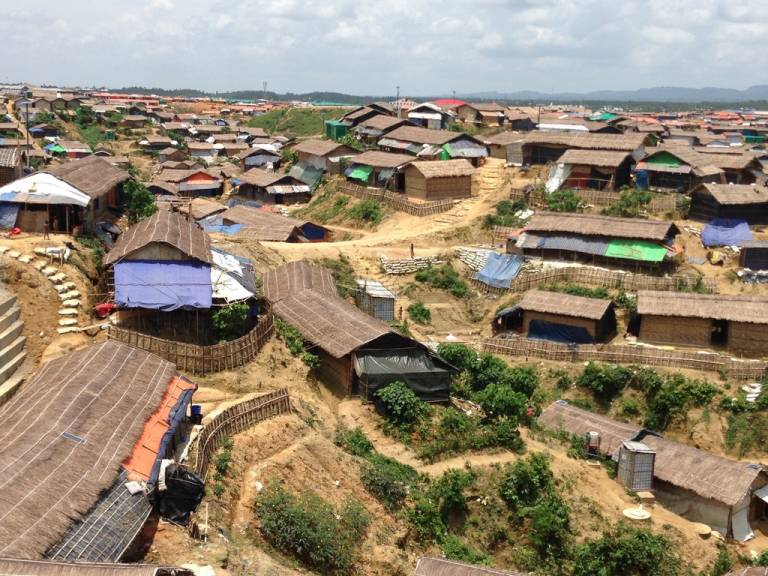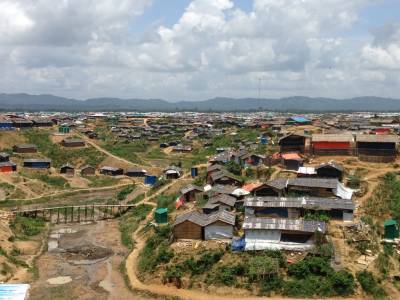Rohingya Journeys of Violence and Resilience in Bangladesh and its Neighbours
4 October 2018
University College London (UCL) - Institute for Risk and Disaster Reduction and Humanitarian Institute - was successful in being awarded a project, "Rohingya Journeys of Violence and Resilience in Bangladesh and its Neighbours: Historical and Contemporary Perspectives".
 The project is funded (£300,000)
by the British Academy under its 'Sustainable Development
Programme 2018' grant scheme which is supported by the UK Government's £1.5billion
Global Challenges Research Fund (GCRF).
The project is funded (£300,000)
by the British Academy under its 'Sustainable Development
Programme 2018' grant scheme which is supported by the UK Government's £1.5billion
Global Challenges Research Fund (GCRF).
The Challenge of the Research
This project will examine the political economy of violence that has resulted in the forced displacement of over two million Rohingya from Myanmar in recent decades. Taking the August 2017 mass-scale exodus from Myanmar following ethnic cleansing as a starting point, we will examine the impact of the violence on this vulnerable refugee community in Bangladesh. These impacts will be contextualised historically and in terms of gender and faith, as we explore how the nationalist ideology and politics behind identity characteristics in Bangladesh, India and Malaysia over the last seven decades have affected Rohingya experiences of welcome and violence in the region today. Importantly, we will examine how the Rohingya refugees' own understandings of violence and risk have shifted as their locations have changed, and what coping mechanisms and aspirations are emerging from within the community as they look towards the future.
Hypothesis
Structural inequalities and systematic, identity-based violence and ethnic cleansing have forcibly displaced Rohingyas into nearby host-countries, where additional (historically-rooted) physical and gendered violence and environmental hazards are exacerbating the community's vulnerability. In these contexts, Rohingyas have deployed coping mechanisms - social, cultural and economic - to attempt to adapt and survive in the face of these shifting risks.
Specific Objectives
1. To understand the political economy of the fresh violence and the gendered nature of its impacts in Bangladesh in contemporary and historical perspective
2. To examine Rohingya refugee self-definitions of risk in the context of physical, social and cultural threats (violence), economic and institutional challenges (structural violence) and environmental threats (hazards) in the three case study host countries.
3. To explore Rohingya refugee coping mechanisms and highlight the different notions of cultural heritage, histories, art and belonging - especially how they have transformed their lives amidst hardships and their relationships with the host communities in selected campsites in Bangladesh, India and Malaysia.

Project Duration: September 2018 - December 2020.
Principal Investigator: Professor Peter Sammonds, UCL Institute for Risk and Disaster Reduction and UCL Humanitarian Institute, University College London (UCL), UK.
Project Coordinator: Dr. Bayes Ahmed, UCL Institute for Risk and Disaster Reduction and UCL Humanitarian Institute, University College London (UCL), UK.
Co-Applicants
[1] Dr Imtiaz Ahmed, Professor of International Relations and Director, Centre for Genocide Studies, University of Dhaka, Bangladesh.
[2] Dr Amena Mohsin, Professor of International Relations, University of Dhaka, Bangladesh.
[3] Dr Maureen Fordham, Professor of Gender and Disaster Resilience, Institute for Risk and Disaster Reduction, and Centre for Gender and Disaster, University College London (UCL), UK.
[4] Dr Kazi Fahmida Farzana, Senior Lecturer, Department of International Affairs, University Utara Malaysia, Malaysia.
[5] Dr Jessica Field, Assistant Professor, School of International Affairs, O. P. Jindal Global University, India.
[6] Md. Touhidul Islam, Chairman, Department of Peace and Conflict Studies, University of Dhaka, Bangladesh.
External Project Link: http://www.hkhresilience.com/rohingya/
Project Partners
§ Department of Disaster Science and Management, University of Dhaka, Bangladesh.
§ Ministry of Disaster Management and Relief, Dhaka, Bangladesh.
§ Refugee Relief and Repatriation Commission (RRRC), Cox's Bazar, Bangladesh.
§ Health Management BD Foundation, Cox's Bazar, Bangladesh.
 Close
Close






